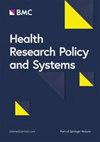探索部门经理在病假管理中使用数据的视角:一项定性研究
IF 3.6
2区 医学
Q1 HEALTH POLICY & SERVICES
引用次数: 0
摘要
本研究的目的是探讨丹麦公共部门工作场所的部门经理对数据作为病假管理工具的看法。本研究是一项定性研究,基于 19 个半结构式访谈,访谈对象是四个公共部门工作场所的部门经理,这些工作场所的特点是病假率高或工作环境差。采用主题分析法对访谈内容进行了归纳分析。研究结果表明,部门经理主要利用数据来识别有因病缺勤风险的员工。所强调的经验与部门经理如何以及何时将数据视为有价值的工具有关,数据中的细微差别、数据的可获取性以及数据的呈现方式是确保对病假采取适当后续行动的重要因素。研究结果表明,部门经理要想利用数据对因病缺勤情况进行适当的管理,数据必须易于获取、简单易懂,并能让部门经理充分了解其工作单位的因病缺勤情况。同样重要的是,在减少因病缺勤时,要考虑到影响因病缺勤的其他因素,如工作环境。本文章由计算机程序翻译,如有差异,请以英文原文为准。
Exploring line managers’ perspectives on using data in managing sickness absence: a qualitative study
The purpose of this study is to explore line managers’ perspectives on data as tool in the management of sickness absence in public sector workplaces in Denmark. The study is a qualitative study based on 19 semi-structured interviews with line managers from four public sector workplaces characterized by high levels of sickness absence or poor work environment. The interviews were analysed inductively using thematic analysis. The findings show that line managers primarily use data to identify employees at risk of sickness absence. The experiences highlighted related to how and when data are perceived as a valuable tool by the line managers, and that nuances in the data, accessibility of the data and how data are presented are important factors to ensure appropriate follow-up on sickness absence. The findings suggest that for line managers to use data to manage sickness absence appropriately, the data must be easily accessible, simple for line managers to understand and provide line managers with a sufficient overview of sickness absence in their work units. It is also important to consider other factors affecting sickness absence, such as the work environment, when aiming to reduce sickness absence.
求助全文
通过发布文献求助,成功后即可免费获取论文全文。
去求助
来源期刊

Health Research Policy and Systems
HEALTH POLICY & SERVICES-
CiteScore
7.50
自引率
7.50%
发文量
124
审稿时长
27 weeks
期刊介绍:
Health Research Policy and Systems is an Open Access, peer-reviewed, online journal that aims to provide a platform for the global research community to share their views, findings, insights and successes. Health Research Policy and Systems considers manuscripts that investigate the role of evidence-based health policy and health research systems in ensuring the efficient utilization and application of knowledge to improve health and health equity, especially in developing countries. Research is the foundation for improvements in public health. The problem is that people involved in different areas of research, together with managers and administrators in charge of research entities, do not communicate sufficiently with each other.
 求助内容:
求助内容: 应助结果提醒方式:
应助结果提醒方式:


